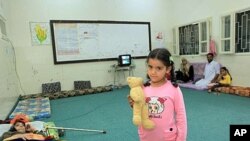The UN refugee agency reports tens of thousands of people on both sides of the battle lines in Libya are facing critical shortages of essential goods. The UNHCR participated in two inter-agency missions last week to government and opposition controlled areas to assess the prevailing situation.
The inter-agency mission went to see both sides of the conflict. U.N. agencies first visited conflict zones south and east of the Libyan capital Tripoli. This included displacement sites in government controlled areas near the Misrata frontline and the Nafusa Mountain.
U.N. refugee spokesman, Adrian Edwards, says the U.N. team found significant displacement, widespread violence and he says they are in urgent need of help.
He says displaced people are in difficult circumstances, but seem to be coping. He says most are housed in hotels, dormitories and seaside homes. He says they are receiving assistance from the government and private charities.
“However, we are concerned about the possibility of an aid crisis looming," he said. "Despite the fact that warehouses are currently well stocked with basic items, it is apparent that the combined impact of protracted conflict and sanctions are eroding the government’s ability to effectively deliver assistance. The view of the inter-agency mission was that if this situation continues, international aid is likely to be needed within weeks.”
On the other side of the battle lines, in opposition-controlled Misrata, the inter-agency mission met members of the Misrata Transitional Council. Edwards says the UNHCR was told most of the 25,000 displaced people in the city are staying with relatives and friends, while others are staying in schools and unoccupied new buildings.
He says this is placing a heavy burden upon people who have not received salaries since January. He calls the situation unsustainable.
“We spoke to several people who reported kidnappings in Misrata and its surroundings," said Edwards. "Local relief agencies and human rights groups in the city estimate that at least 1,000 people, mainly men, have been kidnapped or have disappeared since the conflict started in February."
"A woman told us that her three brothers-in-law were abducted. Two, who were later freed and said they had been taken to a government camp in Zlitan where they had to pledge allegiance before being trained and forced to fight on the government side,” he added.
UNHCR spokesman Edwards says life is slowly picking up in Misrata. Young people are cleaning up the streets and shops are re-opening. But, the Misrata Transitional Council says the city is facing food and medicine shortages.
The UNHCR reports since the beginning of the war, 630 people have been registered dead in five hospitals, while 6,000 people have been injured, many by unexploded ordinance.
People in Battle-Torn Libya Facing Critical Shortages












